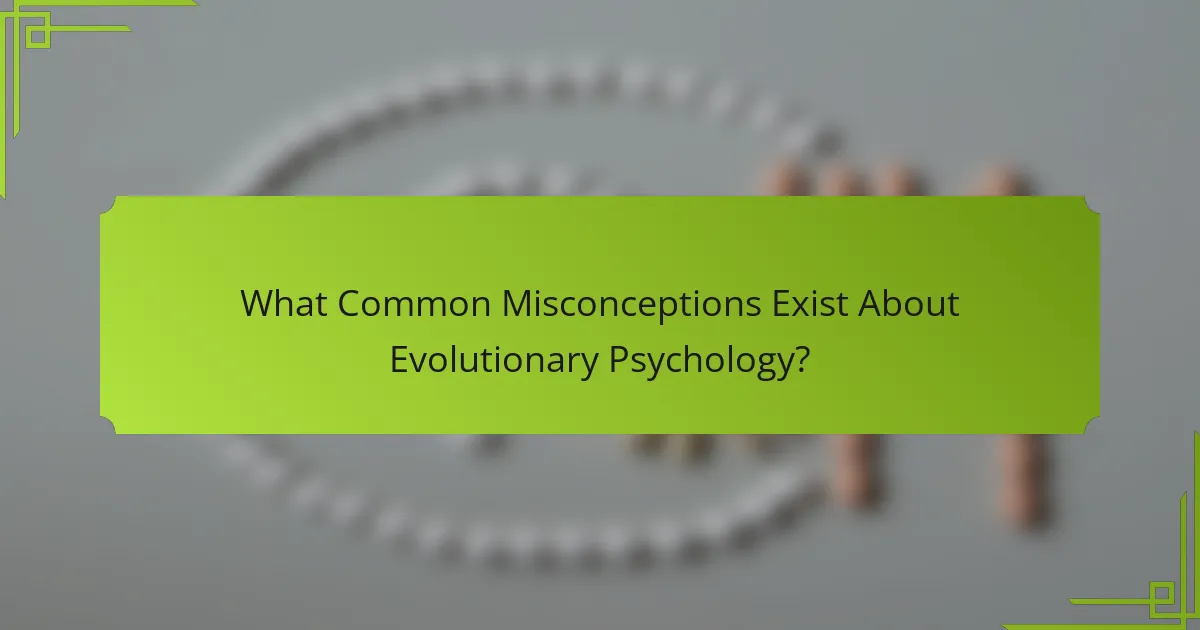Understanding how our behavior and cognition are shaped by both inherited traits and environmental influences is crucial in navigating human development. Evolutionary psychology explores the influence of natural selection, the role of innate psychological mechanisms, and the practical applications in fields like mental health and education. It also addresses common misconceptions and emphasizes the interplay between biological predispositions and cultural experiences. By examining these dimensions, we can gain insights into our psychological functions and social behaviors.

What is Evolutionary Psychology?
Evolutionary psychology studies how human behavior and cognition are influenced by evolutionary processes. This field bridges nature and nurture, examining how inherited traits and environmental factors shape psychological functions. Key concepts include adaptation, survival, and reproductive success, which inform our understanding of social behaviors and mental processes. For example, evolutionary psychology explores why certain fears, like those of snakes or heights, may be innate due to ancestral survival needs. This perspective highlights the interplay between biological predispositions and cultural experiences in human development.
How does it integrate nature and nurture?
Evolutionary psychology integrates nature and nurture by examining how genetic predispositions interact with environmental influences in human development. This field highlights that behaviors and mental processes are shaped by evolutionary forces while also being modified by cultural and social contexts. For instance, innate traits such as aggression can be tempered or amplified by upbringing and societal norms. The interplay of these factors illustrates that human behavior cannot be fully understood without considering both biological and environmental contributions.
What are its foundational theories?
Evolutionary psychology is grounded in several foundational theories that explore the interplay of biology and environment in shaping human behavior. Key theories include the adaptationist perspective, which posits that certain psychological traits evolved to solve problems faced by our ancestors. Another significant theory is the modularity of the mind, suggesting that the brain consists of specialized modules evolved for specific functions. Additionally, the theory of parental investment highlights how reproductive strategies influence behavior and social structures. These theories collectively illustrate how evolutionary processes contribute to human development and behavior.
How does natural selection influence behavior?
Natural selection shapes behavior by favoring traits that enhance survival and reproduction. Behaviors that improve adaptation to environments are passed on, influencing social interactions and decision-making. For example, altruism can increase group survival, aligning individual actions with evolutionary benefits. This interplay between genetics and environment exemplifies the core of evolutionary psychology.
What role do adaptations play in human psychology?
Adaptations play a crucial role in human psychology by shaping behaviors and thought processes. They influence how individuals respond to their environment, helping to ensure survival and reproduction. For example, the development of social bonding mechanisms promotes cooperation, which enhances group survival. Unique adaptations, such as the ability to empathize, facilitate complex social interactions. As a result, adaptations are fundamental to understanding the interplay between biological evolution and psychological development in humans.

What are the universal attributes of Evolutionary Psychology?
The universal attributes of Evolutionary Psychology include the influence of natural selection, the interplay between genetics and environment, adaptive behaviors, and the focus on universal human traits. These attributes highlight how human psychology has evolved to meet survival and reproductive needs, bridging innate tendencies with learned experiences.
How does it explain human behavior across cultures?
Evolutionary psychology explains human behavior across cultures by examining innate psychological traits shaped by natural selection. It highlights universal behaviors, such as social bonding and aggression, which manifest differently depending on cultural contexts. For example, while the need for cooperation is evident globally, the expression of this need varies based on local norms and values. This interplay of biological instincts and cultural influences illustrates how evolution has crafted a diverse yet fundamentally connected human experience.
What common psychological traits are observed?
Common psychological traits observed in evolutionary psychology include adaptability, social cooperation, and risk assessment. These traits reflect how humans evolved to navigate complex environments. Adaptability allows individuals to thrive in varied circumstances, while social cooperation enhances group survival. Risk assessment helps in making decisions that balance potential rewards against dangers. Understanding these traits provides insight into human behavior and development.
How do emotions evolve from an evolutionary perspective?
Emotions have evolved as adaptive responses to environmental challenges and social interactions. They enhance survival by facilitating communication, bonding, and decision-making. For instance, fear triggers fight-or-flight responses, while joy fosters social connections. This evolutionary perspective highlights the interplay between innate biological processes and learned experiences in shaping emotional responses. Emotions also reflect unique attributes, such as cultural influences, which can modify their expression and interpretation across different societies. Understanding these dynamics offers insights into human behavior and development.
What are the cognitive processes influenced by evolution?
Cognitive processes influenced by evolution include problem-solving, memory, and social interaction. These processes have developed to enhance survival and reproduction. For example, problem-solving abilities allow humans to navigate complex environments effectively. Memory plays a crucial role in learning from past experiences, while social interaction fosters cooperation and community building. Understanding these processes reveals how evolutionary pressures shape human behavior and cognition.

What unique attributes distinguish Evolutionary Psychology?
Evolutionary psychology is distinguished by its focus on innate psychological mechanisms shaped by evolutionary pressures. Unique attributes include an emphasis on universal human behaviors, the integration of biological and cultural factors, and the application of evolutionary theory to explain modern psychological phenomena. These traits enable a deeper understanding of human nature and development, bridging the gap between nature and nurture.
How does it differ from traditional psychology?
Evolutionary psychology differs from traditional psychology by emphasizing innate biological factors in human behavior. Traditional psychology often focuses on environmental influences and learned behaviors. Evolutionary psychology posits that many psychological traits are adaptive responses shaped by natural selection. This perspective highlights the interplay between genetics and environment, offering insights into behaviors that traditional approaches may overlook. For instance, it explores how evolutionary pressures might influence social behavior, mating strategies, and parenting styles, which are less emphasized in conventional psychological theories.
What specific evolutionary mechanisms are emphasized?
Evolutionary psychology emphasizes mechanisms such as natural selection, sexual selection, and kin selection. These processes shape human behavior and cognition, blending biological imperatives with environmental influences. Natural selection drives adaptations that enhance survival. Sexual selection influences mate choice and reproductive strategies. Kin selection promotes altruistic behaviors towards relatives, enhancing genetic survival. Each mechanism highlights the interplay between innate biological factors and learned experiences.
How does sexual selection shape human relationships?
Sexual selection significantly influences human relationships by shaping mate preferences and reproductive strategies. This process leads to various traits that enhance attractiveness, such as physical appearance and social status. Research indicates that these preferences are often rooted in evolutionary psychology, where individuals seek partners who can provide genetic advantages or resources. Unique attributes like cultural influences also play a role, as societal norms can modify the criteria for mate selection over time. As a result, understanding sexual selection provides insights into the dynamics of attraction and partnership in human development.
What insights does it provide on parenting and kinship?
Evolutionary psychology offers insights into parenting and kinship by highlighting the biological and psychological mechanisms that shape family dynamics. It emphasizes the role of attachment, parental investment, and kin selection in human development. Research indicates that secure attachments foster emotional resilience, while kinship bonds enhance cooperative behavior and resource sharing among relatives. Understanding these dynamics can inform modern parenting practices and strengthen family relationships.

What are the rare attributes of Evolutionary Psychology?
Evolutionary psychology has several rare attributes that differentiate it from other psychological frameworks. These include a focus on ancestral environments, which influences contemporary behavior, and the integration of cross-disciplinary insights from genetics, anthropology, and neuroscience. Another rare attribute is its emphasis on the role of evolved psychological mechanisms in shaping social behaviors, such as mating strategies and altruism. Additionally, evolutionary psychology uniquely addresses the impact of evolutionary pressures on cognitive functions, which is not typically emphasized in other psychological theories.
What uncommon theories exist within the field?
Uncommon theories in evolutionary psychology explore unique perspectives on human behavior. One such theory is the “Biphasic Model of Evolution,” which posits that human development is influenced by both ancestral environments and modern societal pressures. This model suggests that our psychological traits have evolved to adapt to both hunter-gatherer lifestyles and contemporary challenges. Another theory is the “Cognitive Dissonance Hypothesis,” which examines how conflicting beliefs shape decision-making processes, emphasizing the role of evolutionary pressures in resolving internal conflicts. These theories challenge traditional views and highlight the complexity of human development through the lens of evolutionary psychology.
How do niche adaptations manifest in human behavior?
Niche adaptations manifest in human behavior through specialized responses to environmental challenges. These adaptations can enhance survival and reproduction, influencing social dynamics and cognitive processes. For instance, individuals in resource-scarce environments may develop heightened cooperation skills. Unique attributes, such as cultural practices, further shape behavioral variations across different populations. As a result, understanding these adaptations provides insights into the interplay between biological predispositions and cultural influences in human development.
What are the implications of evolutionary mismatches?
Evolutionary mismatches can lead to maladaptive behaviors and health issues. These occur when human evolution does not keep pace with rapid environmental changes. For example, modern diets high in sugar contrast with ancestral food scarcity, increasing obesity rates. Additionally, social isolation in urban settings can exacerbate mental health problems, highlighting a disconnect between evolved social needs and contemporary lifestyles. Understanding these mismatches can inform interventions that align modern living with our evolutionary heritage.
How can we observe evolutionary influences in modern society?
Evolutionary influences are evident in modern society through behaviors, social structures, and decision-making processes. Human instincts, shaped by evolutionary pressures, manifest in various aspects of daily life. For example, kin selection promotes family-oriented behaviors, while competition influences social hierarchies. Additionally, modern mental health challenges can be traced back to evolutionary mismatches, illustrating the ongoing impact of our ancestral past on contemporary issues. These insights from evolutionary psychology help bridge nature and nurture, revealing the complex interplay that shapes human development today.

What are the practical applications of Evolutionary Psychology?
Evolutionary psychology has practical applications in various fields, including mental health, education, and marketing. It helps understand human behavior by examining how evolutionary factors shape psychological processes.
In mental health, insights from evolutionary psychology inform therapeutic approaches. For example, recognizing that anxiety may stem from ancestral survival mechanisms allows for targeted interventions.
In education, principles of evolutionary psychology guide curriculum development. Understanding innate learning preferences can enhance teaching methods and improve student engagement.
In marketing, evolutionary psychology aids in consumer behavior analysis. Marketers can tailor strategies to align with innate human desires, increasing the effectiveness of campaigns.
How can it inform mental health practices?
Evolutionary psychology informs mental health practices by highlighting the interplay between genetics and environment in shaping behavior. This perspective emphasizes understanding behavioral patterns through a lens of adaptation. For instance, recognizing innate responses to stress can guide therapeutic approaches. Integrating evolutionary insights allows practitioners to tailor interventions that align with natural human tendencies, enhancing treatment effectiveness.
What strategies can enhance interpersonal relationships?
Effective strategies to enhance interpersonal relationships include active listening, empathy, open communication, and shared experiences. These approaches foster understanding and connection. Active listening encourages individuals to fully engage in conversations, while empathy allows for deeper emotional connections. Open communication builds trust and transparency. Shared experiences create lasting bonds and memories, reinforcing the relationship’s foundation.
What are effective communication techniques based on evolutionary insights?
Effective communication techniques informed by evolutionary insights include active listening, empathy, and nonverbal cues. These methods enhance social bonds and facilitate understanding, crucial for human cooperation. For example, eye contact signals attentiveness, while mirroring body language fosters rapport. Additionally, storytelling taps into our innate preference for narratives, making information more relatable and memorable. Understanding these techniques can improve interpersonal relationships and group dynamics.
How can understanding evolutionary psychology improve conflict resolution?
Understanding evolutionary psychology enhances conflict resolution by providing insights into human behavior rooted in survival instincts. This perspective reveals that many conflicts arise from innate drives, such as competition for resources and the need for social cohesion. Recognizing these underlying motivations allows individuals to approach conflicts with empathy and a focus on collaboration.
For example, understanding that aggressive behaviors may stem from evolutionary survival mechanisms can shift the focus from blame to constructive dialogue. This approach fosters an environment where parties can negotiate solutions that satisfy their fundamental needs, leading to more effective resolutions.
Additionally, evolutionary psychology highlights the importance of communication styles shaped by our ancestral environments. By adapting communication methods to align with these evolutionary traits, individuals can reduce misunderstandings and promote cooperative interactions.
In summary, applying principles of evolutionary psychology to conflict resolution encourages a deeper understanding of human behavior, ultimately leading to more effective and harmonious outcomes.

What common misconceptions exist about Evolutionary Psychology?
Common misconceptions about evolutionary psychology include the belief that it solely emphasizes genetics over environment, ignores cultural influences, and promotes deterministic views of behavior. Many think it reduces complex human behaviors to simple evolutionary explanations, overlooking the nuances of human experience. Additionally, some assume evolutionary psychology justifies negative social behaviors, while it actually seeks to understand their origins. Misunderstandings about its scientific rigor also persist, leading to skepticism about its validity in explaining human development.
How is it misunderstood in popular culture?
Evolutionary psychology is often misunderstood as deterministic, reducing human behavior solely to genetics. This oversimplification neglects the significant role of environmental influences and cultural factors in shaping behavior. Many people view evolutionary psychology as a justification for social hierarchies or stereotypes, rather than understanding it as a framework for exploring the complex interplay between nature and nurture. Misinterpretations can lead to misconceptions about human potential and adaptability, overlooking the unique capacity for change and growth inherent in individuals.
What are the limitations of its theories?
Evolutionary psychology theories face several limitations. They often rely on speculative interpretations of human behavior, which can lead to overgeneralizations. Additionally, these theories may underrepresent cultural and environmental influences, limiting their applicability across diverse populations. The focus on biological determinism can overshadow the significance of individual experiences and social contexts. Lastly, empirical validation of evolutionary psychology claims can be challenging, leading to debates about the robustness of its findings.

How can one apply principles of Evolutionary Psychology in daily life?
Applying principles of Evolutionary Psychology in daily life involves understanding human behavior through the lens of our evolutionary past. Recognize innate predispositions influencing decision-making, social interactions, and emotional responses. For example, cultivate relationships that enhance social bonds, as these are rooted in survival instincts. Additionally, adopt strategies that align with our natural inclinations, such as prioritizing physical activity and social connectivity. This awareness can lead to improved mental health and well-being, fostering a balanced lifestyle that resonates with our evolutionary heritage.
What best practices should be followed?
To effectively apply evolutionary psychology in human development, adhere to these best practices: prioritize interdisciplinary collaboration, integrate empirical research with theoretical frameworks, and focus on real-world applications. Understand the interplay between genetic predispositions and environmental influences, as this duality shapes human behavior. Regularly evaluate and adapt methodologies based on emerging findings to ensure relevance and accuracy.
What mistakes should be avoided when applying these principles?
Avoiding mistakes in applying evolutionary psychology principles ensures accurate understanding and effective application. Common errors include oversimplifying complex behaviors, neglecting cultural influences, and failing to integrate empirical evidence. Misinterpretation of evolutionary concepts can lead to misconceptions about human nature. Additionally, ignoring individual variability undermines the nuanced understanding of human development. Finally, not considering the interplay between genetics and environment can distort insights into behavior.
How can we critically assess evolutionary claims?
To critically assess evolutionary claims, one must evaluate the underlying evidence and methodologies. This involves examining empirical data, considering alternative explanations, and analyzing the consistency of claims with established scientific knowledge. Critical thinking is essential in distinguishing between well-supported theories and speculative assertions. Additionally, understanding the interplay between genetic predispositions and environmental influences enhances the assessment of evolutionary psychology claims.
What resources are available for further learning?
Numerous resources are available for further learning about evolutionary psychology. Books like “The Adapted Mind” provide foundational insights, while online courses from platforms such as Coursera offer structured learning. Academic journals, including “Evolutionary Psychology,” publish the latest research. Additionally, podcasts and webinars featuring experts in the field can enhance understanding and engagement.
